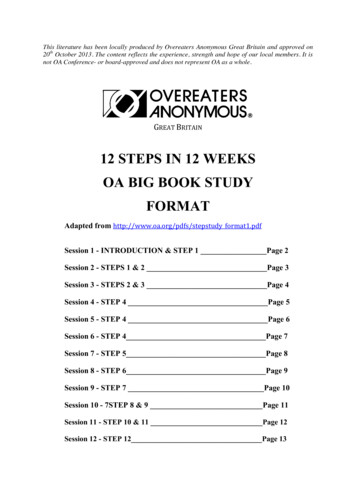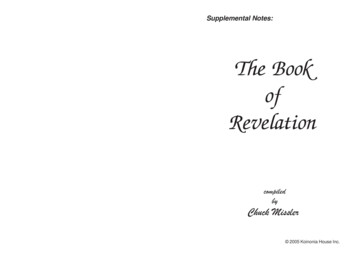
Transcription
8-SESSIONBIBLE STUDYSEVENREALITIESFOREXPERIENCINGGODHow to Know and Do the Will of GodHENRY & RICHARD BLACKABY
REALITY 1GOD’S WORKGod is always at work around you.16
God didn’t create the world and then abandon it to function on itsown. He’s been actively involved in human affairs throughout history. In fact, He’s orchestrating history. Because of sin, humanityhas been separated from a close relationship with God. God isworking in His world to bring about the redemption of thosewho are alienated from Him and facing imminent judgment anddestruction. The Father is working through Christ to reconcilethe world to Himself. In God’s sovereignty He’s chosen to accomplish His work through His people. As He carries out His mission,He seeks to move people into the mainstream of His activity.God was already at work around Moses’ life when Heencountered Moses at the burning bush. God had a purpose He wassteadily working out in Moses’ world. Even though Moses was anexile in the desert, he was right on God’s schedule, in the fullnessof God’s timing, in the middle of God’s will for that moment.Years earlier God told Abraham that his descendants wouldbe in bondage but that He would deliver them and give them thepromised land. God was watching and waiting for the right timeto carry out His purpose for Israel.At the time God was about to deliver the children of Israel, theoverriding concern was His will for Israel, not His will for Moses.God was at work with Israel, and He was preparing to bring Mosesinto the mainstream of His activity to redeem His people.This truth also applies to your life. God is actively working inthe lives of people around you, even when you don’t recognize it.However, unless God opens your spiritual eyes to recognize whatHe’s doing, you’ll remain blind to His presence and His work.17
day 1MIRACULOUS ACTIVITYNow get up and stand on your feet. I have appearedto you to appoint you as a servant and as a witnessof what you have seen and will see of me.ACTS 26:16God was working in your life long before you began following Him. The Lordknew you before time began, and He knew what He wanted to do with your life(see Ps. 139:13; Jer. 1:5).Before the apostle Paul’s conversion experience on the road to Damascus,Jesus already knew Paul and had a specific assignment for him. But Jesusrevealed this assignment only after Paul’s conversion (see Acts 9:15). Paul was somisguided that in his sincere efforts to serve God, he had actually been wagingwar against Christians. Although God knew what He wanted for Paul, He waitedto reveal it to him until He gained his attention and became his Lord.Our Lord doesn’t come to us to discover what we’d like to accomplish forHim. He encounters us in order to reveal His activity and invite us to becomeinvolved in His work. An encounter with God requires us to adjust ourselves tothe activity of God that’s been revealed. God never communicates with us merelyto give us a warm devotional thought for the day. He never speaks to us simplyto increase our biblical knowledge. Our Lord has far more significant things toreveal to us than that. When God shows us what He’s doing, He invites us to joinHim in His activity.Do you want to experience God today? Don’t seek to hear from God unlessyou’re ready to ask, as Paul did, “What shall I do, Lord?” (Acts 22:10).As you read the accounts of God’s miraculous work through men and womenin the Bible, you may wonder whether God still performs such miracles today.Be assured that the same God who walked with Moses, Joshua, Elijah, Peter,James, John, and Paul now lives within you. No power can defeat the God whoguides you. The God who blessed them is just as capable of working out Hispurposes through your life. The same God who gave them victory over seeminglyinvincible enemies, who provided for them when their own resources were insufficient, and who guided them in their decisions is prepared to work as powerfullyin your life today.18Seven Realities for Experiencing God
Too often we acknowledge our belief that God can do whatever He wants;then we add a safety clause: “But I just don’t think God will do that with me.”We become practical atheists, believing God can perform miracles but neverexpecting a miracle in our own lives.The heroes of the faith had one thing in common: they were all ordinarypeople with no power of their own. The difference was the mighty presence ofGod. Times may change, but the miraculous effect of God’s presence remainsthe same.When did you first experience God?1 Whom did He work through tobring you to faith through the gospel? Record as many details as you canremember about your conversion story. Consider what your life would belike if God hadn’t been at work to save you. How is your story a miracle?In what specific area of your life do you struggle to believe that Godis at work and has a plan?What was the most meaningful statement or Scripture you read today?Reword the statement or Scripture into a prayer of response to God.What does God want you to do in response to today’s study?1. If you haven’t experienced God by first responding in faith to the work of Jesus Christ,go to the back of this book to learn how to begin a personal relationship with God.Reality 119
day 2THE ONGOING WORKOF SALVATIONWork out your salvation with fear and trembling,for it is God who works in you to will and toact in order to fulfill his good purpose.PHILIPPIANS 2:12-13Salvation isn’t just an event; it’s also a process. Salvation is God’s gift, for there’snothing we can do to save ourselves (see Eph. 2:8-9). Yet with salvation comesthe responsibility to work out our salvation.This is the great paradox of the Christian life. We’re to work diligently on ourfaith yet always with the awareness that only God can bring about lasting changein our lives. As we see God at work in us, we’re motivated to work even morediligently.God won’t force His changes on us; neither can we bring about lasting changein our lives apart from the work of the Holy Spirit. An examination of the fruit ofthe Spirit can be intimidating (see Gal. 5:22-23). Working all nine of these traitsinto your life seems impossible, and indeed it is. But the moment you became aChristian, the Holy Spirit began a divine work to produce Christ’s character in you.And He’s always faithful to complete the work He begins (see Phil. 1:6).Regardless of who you are, the Spirit works from the same model, JesusChrist. The Spirit looks to Christ to supply the blueprint for your character. TheSpirit immediately begins helping you experience and practice the same loveJesus had when He laid down His life for you, His friend (see John 15:13). Thesame joy He experienced will now fill you. The identical peace that guarded theheart of Jesus, even as He was being beaten and mocked, will be the peace theSpirit works to instill in you. The patience Jesus had for His seemingly unteachable disciples will be the patience the Spirit now develops in you. The kindnessJesus showed toward children and sinners will soften your heart toward others.There will be a goodness about you that can be explained only by the presence ofthe Spirit of God. The Spirit will build the same faith in you that led Jesus to beentirely obedient to His Father. The Spirit will teach you self-control so that you’llhave strength to do what’s right and to resist temptation.Because the Spirit livesin you, all this will occur as naturally as the growth of fruit on a tree.20Seven Realities for Experiencing God
You can’t orchestrate spiritual growth on your own. It automatically beginsthe moment you become a believer. How quickly it happens depends on howcompletely you yield yourself to the Holy Spirit’s activity. When you sense Goddeveloping an area of your life, join Him in His activity so that His salvation willbe fully demonstrated in you.What does God want to do in you? Have you allowed Him to complete whatHe has begun? He won’t force you to receive all He has for your life. If God’s workhasn’t been brought to fruition in you, it’s not that Christ hasn’t been diligentlyworking toward that end. Rather, you may need to release areas of your life toHim and be as determined as Christ is to see God’s work completed in you.How have you experienced the ongoing work of salvation as you’vegrown spiritually?Where is the Spirit most evident in your life, producing the fruitdescribed in Galatians 5:22-23?What areas do you most struggle with in working out your salvation?What was the most meaningful statement or Scripture you read today?Reword the statement or Scripture into a prayer of response to God.What does God want you to do in response to today’s study?Reality 121
day 3A GOD-CENTEREDPERSPECTIVEThe Spirit told Philip, “Go to that chariot and stay near it.”ACTS 8:29God is always at work. He’s on mission. What we call missions is simply Godfinding people whose hearts are spiritually prepared and placing them where theycan make a difference for His kingdom. Some of the great missionaries in historydidn’t live long lives, but their lives dramatically affected eternity.For example, God had Philip’s attention, and the Book of Acts gives theexciting account of how He used Philip’s life to take the gospel to the ends of theearth. Philip was powerfully preaching in the city of Samaria (see Acts 8:5-8). Godused him so mightily that the entire city rejoiced at the miracles God was doing.This would be any evangelist’s fondest desire: to see an entire city respondingto the gospel through his preaching. Yet Philip wasn’t activity-centered in hisChristian life. He was God-centered. Philip wasn’t preoccupied with expandinghis reputation as a great preacher or miracle worker. He was concerned that hislife remain in the center of God’s activity.When God instructed Philip to leave his fruitful ministry in Samaria, he didn’thesitate (see vv. 26-40). He was prepared. He was attentive. He experiencedGod by joining the mainstream of God’s activity.God continues to seek those as responsive as Philip to go on mission withHim. The reason God’s movement isn’t evident in more places today isn’t thatHe’s unable or unwilling to work. He first looks for those willing to have theirlives radically adjusted away from their self-centered activities and placed in thecenter of God’s activity around the world.A God-centered perspective is the key to being spiritually prepared for God’swork. If you’re spiritually prepared when a crisis comes, you won’t have to tryto instantly develop the quality of relationship with Christ that can sustain you.If you have a God-centered focus and suddenly have an opportunity to shareyour faith with an unbeliever, you’ll be equipped to do so. If you enter a timeof worship spiritually prepared, you won’t miss an encounter with God. If you’respiritually filled when you meet a person in sorrow, you’ll have much to offer.22Seven Realities for Experiencing God
If you’ve established safeguards in your life in advance, you won’t give in totemptation.Christians lose many opportunities to experience God’s activity because theyhaven’t devoted enough time to their relationship with God. If you haven’t yetdeveloped the habit of daily prayer and Bible study, why not begin now so thatyou’ll be spiritually equipped for whatever life brings?How are you developing a God-centered perspective, spiritually preparingyourself to join God’s work? Identify a time and a place in your dailyroutine that you can spend in prayer and Bible reading.Identify an area of your life that’s going well. What does it mean to havea God-centered perspective in that area of your life?Identify an area of your life that’s currently difficult. What does it meanto have a God-centered perspective in that area of your life?What was the most meaningful statement or Scripture you read today?Reword the statement or Scripture into a prayer of response to God.What does God want you to do in response to today’s study?Reality 123
day 4GOOD WORK ORGOD’S WORKA Samaritan, as he traveled, came where the manwas; and when he saw him, he took pity on him.LUKE 10:33If anyone could understand the temptation to let busyness distract Him from theFather’s activity, Jesus certainly could.In Luke 10 He told a parable that clearly illustrated this danger. A certainJewish man was on his way to Jericho when he was brutally attacked by thievesand left to die by the road. First a Levite, then a priest passed by. These werereligious leaders; surely they’d show compassion to a wounded person. But theyhad places to go and appointments to keep, so they passed him by.Then a Samaritan, despised by the Jews, came along. Of all people, this manhad reason to look the other way since the wounded man was his enemy. Butwherever he was going could wait, for someone needed his help.It’s easy to become so busy that you’re oblivious to people in need. Yourschedule can become so full of accomplishing good things that you’re no help tothe people around you.God is at work in the lives of your friends, your neighbors, and your familymembers. He may ask you to interrupt your day long enough to join Him as Heministers to them. Nothing on your agenda, no matter how pressing, is reasonenough to ignore the voice of God when He tells you to stop and help. If you’vebecome too busy to minister to those around you, ask God to reestablish yourpriorities so that you don’t miss opportunities to serve Him.Even Jesus realized that His role was that of a servant (see Matt. 20:28). Henever sought to initiate activity for the Father. A servant never sets the agenda;the master does. The servant must be so alert to what the master is doing thatwhenever the master begins to move in a direction, the servant quickly joinshim. Jesus knew His Father so well that He was keenly sensitive to divine activityaround Him, immediately recognizing His Father at work.It’s possible for us to be so busy trying to bring God into our activity that wedon’t notice Him at work around us. God seeks to redirect our attention so thatwe can join Him, but we tend to be self-centered, evaluating everything by the24Seven Realities for Experiencing God
way it affects us. We must learn to view events around us from God’s perspective.Then we’lll see our world very differently. When God brings someone across ourpath, we’ll look to see whether God is convicting that person of the need forsalvation. Perhaps God is comforting someone in sorrow. God might be encouraging one of your friends as he or she faces a challenge. We should then adjustour lives to join God as He works in that person’s life. We ought to live each daywith tremendous anticipation as we look to see where God is working around us.As our eyes are opened to His activity, we’ll marvel at His great works.On a scale of 1 to 10 (1 overwhelmingly full schedule; 10 wide open),how much room do you have in your daily routine?On a scale of 1 to 10 (1 definitely wouldn’t; 10 definitely would),how likely would you be to notice if God wanted to interrupt your plans?On a scale of 1 to 10 (1 definitely wouldn’t; 10 definitely would),how likely would you be to change your plans if God made you awareof an opportunity to join His work?Honestly, which best describes your life in relation to God’s will? I never think about God’s will. I try to live a good life and hope God’s pleased with it. I make plans and ask for God’s help to accomplish my daily activities. I seek to know God’s will and then change my life to join the workHe’s doing.What was the most meaningful statement or Scripture you read today?Reword the statement or Scripture into a prayer of response to God.What does God want you to do in response to today’s study?Reality 125
day 5PLACE AND PURPOSENow I want you to know, brothers and sisters, that what hashappened to me has actually served to advance the gospel.PHILIPPIANS 1:12There are two ways to look at every situation: how it will affect you and how itwill affect God’s kingdom. The apostle Paul was always concerned with how hiscircumstances could aid the spread of the gospel. When he was unjustly imprisoned, he immediately looked to see how his imprisonment could bring God’ssalvation to others (see Acts 16:19-34; Phil. 1:13). When he was assailed by anangry mob, he used the opportunity to preach the gospel (see Acts 22:1-21).When Paul’s criminal proceedings took him before King Agrippa, his thoughtswere on sharing his faith with the king (see Acts 26). Even when Paul wasshipwrecked on an island, he used that circumstance to join God’s activity (seeActs 28:7-9). Regardless of his circumstance, Paul’s concern was using his currentsituation to tell others of God’s good news of salvation.Often when we encounter a new situation, our first thoughts aren’t aboutGod’s kingdom. When we face a crisis, we can become angry or fearful for ourown well-being rather than looking to see what God intends to do through ourcircumstances. If we remain self-centered, we miss much of what God could dothrough our experiences, both for us and for those around us.Will you dare to believe that God, who called you to Himself and equippedyou with His Spirit, could work mightily through you? Have you made the connection between the time and place in which you live and God’s call on you?He placed you precisely where you are for a purpose.World events never catch God by surprise. History is replete with examplesof Christian men and women who believed God would work through them tomake a significant difference for His kingdom. God strategically placed Josephto become the most powerful adviser to the pharaoh in Egypt and to save Jacoband his family from a devastating drought (see Gen. 41:39-40; 45:5-7). Godstrategically placed Esther in the king’s court at a crucial time when she couldsave the lives of God’s people (see Esth. 4:14).26Seven Realities for Experiencing God
The same God who was at work in and through the lives of biblical heroesis still at work today. Reading those stories, we may forget that real men andwomen had to trust God to work in incredibly difficult situations. We know theend of the story. But they were living in the middle of it.You’re a part of the same adventure—the narrative of God’s kingdom.Wherever you are, the story’s about Him. It’s not about you. And because it’sGod’s story, you can be sure He has a plan for where you are right now. He’sdoing something in you or through you for His purposes. God is always at workaround you. Even if you don’t understand, trust the One who says:As the heavens are higher than the earth,so are my ways higher than your waysand my thoughts than your thoughts.ISAIAH 55:9There are two ways to look at every situation: how it will affect you andhow it will affect God’s kingdom. Which best describes your perspective?How are you allowing your current situation to determine the wayyou invest your life?How are you letting God use you to make a difference in your generation?What was the most meaningful statement or Scripture you read today?Reword the statement or Scripture into a prayer of response to God.What does God want you to do in response to today’s study?Reality 127
How Am I Experiencing God?Use this space to journal about your experience with God,in particular Reality 1: God is always at work around you.28Seven Realities for Experiencing God
Reality 129
SE V EN R E A L I T I E S FO REXPERIENCING GODGROUP SESSION—REALITY 1GOD IS ALWAYS AT WORK AROUND YOUSTARTStart with review and prayer. Ask volunteers to summarize the truths discussedlast week in the study of Hebrews 11:1-6,23-29.Ask God to open your hearts and minds to the work He wants to do in andthrough your lives.READ & RESPONDTransition to a study of the biblical text and Reality 1. Read aloud Exodus 1–2.Knowing that God would use Moses to confront Pharaoh and lead the Israelitesout of slavery, discuss examples of Reality 1 in Exodus 1–2. (Refer to p. 17 foran overview of Reality 1, if needed.)How was God at work during the birth of Moses (see 1:15–2:2)?How was God at work during the childhood of Moses (see 2:1-10)?How was God at work when Moses was a young man (see 2:15-25)?In what way was God’s work much bigger than just saving Moses’ life(see 2:23-25)?When we can’t see God at work, what comfort comes from 2:24-25?30Seven Realities for Experiencing God
REVIEWContinue the discussion on a personal level by connecting themes from thedaily reading with Reality 1. (Allow these questions to serve as a guide, but feelfree to discuss any meaningful statements from or actions taken in response tothe daily reading.)Day 1In what specific area of your life do you struggle to believe that Godis at work and has a plan?What encouragement (and/or conviction) do you receive in knowingthat the same God is at work in your life as in the lives of biblical heroeslike Moses?Day 2In John 5:17 Jesus said, “My Father is always at his work to this veryday, and I too am working.” In what ways is God at work to shape yourcharacter for His purposes?Day 3What routines have you established in your life to keep you alertto God’s work around you?Day 4In Exodus 2:11-15 Moses took matters into his own hands instead oflooking to see how God was at work. When have you made a mess doingthings through your own efforts or focusing too much on your own desires,thereby missing an opportunity to join God’s work?When have you experienced God by recognizing an opportunity to joinHis work?G r o u p S e ss i o n — R e a l i t y 131
Honestly, which of the following best describes your life in relationto God’s will? I never think about God’s will. I try to live a good life and hope God’s pleased with it. I make plans and ask for God’s help to accomplish my daily activities. I seek to know God’s will and then change my life to join the workHe’s doing.Day 5God wasn’t focused only on Moses’ life. He was at work in and throughMoses for the sake of a much bigger plan. You’re not where you arein life by mistake or coincidence. How has God worked in your lifethrough people or events you would otherwise consider to have beencoincidental?There are two ways to look at every situation: how it will affect you andhow it will affect God’s kingdom. Which best describes your perspective?How could God use your present circumstances to bless others and makea difference in this generation?How have you been challenged this week in regard to knowing and doingthe will of God?32Seven Realities for Experiencing God
EXPERIENCING GOD STORIESUse this opportunity to share ways you’ve experienced God.Would anyone like to share a story about a time when you’ve experiencedGod’s work in your life?When have you felt that God might not care or know about your situation?Looking back, how did you experience God and see that He was alwaysat work around you?How might God’s work in your life be for more than just your benefit?WRAP UPConclude the session by reading this final thought and then closing in prayer.The first reality for experiencing God is that God is alwaysat work around you. God’s work may go unnoticed at first,but His purpose is to move people into the mainstream ofHis activity. He’s on mission to save people by His grace.Ultimately, this mission is even bigger than Moses andthe Israelites in Egypt. God’s mission is to save peoplethrough Jesus Christ. His Spirit is still at work in ourlives today so that we too can know and do His will.Next week we’ll discuss Reality 2: God pursues a continuinglove relationship with you that is real and personal.G r o u p S e ss i o n — R e a l i t y 133
REALITY 2RELATIONSHIPGod pursues a continuing love relationshipwith you that is real and personal.34
Real Christianity isn’t merely a religion; it’s a relationship with aPerson. God created humanity for a love relationship with Him.More than anything else, God wants us to love Him with ourtotal being (see Mark 12:30). He’s the One who pursues a loverelationship with us. We don’t naturally seek God on our owninitiative. Everything we’re experiencing from God comes inresponse to His invitation. In fact, He dramatically reached outto us by sending His Son, Jesus (see John 3:16). God clearlydemonstrated how valuable a love relationship is to Him whenHe permitted Jesus to die an excruciating death on a cross inorder to make a relationship with us possible (see Rom. 5:8).This intimate love relationship with God is both extremelypersonal and practical. This is probably the most important factorin knowing and doing the will of God. If your love relationshipwith God isn’t as it should be, nothing else will be in order.God took the lead in inviting Moses into a personal, dynamicrelationship with Him. Moses had led the sheep he was tendingto Horeb, the mountain of God. He was in the middle of his day,but God interrupted Moses’ plans by encountering him at theburning bush.Time and time again, God invited Moses to talk with Himand to be with Him. God initiated and maintained a growingrelationship with Moses. The fellowship was based on love, andGod daily fulfilled His purposes through Moses. This relationshipwith God was extremely practical as God guided and provided forHis people under Moses’ leadership.35
day 1MORE THAN RELIGIOUSKNOWLEDGEYou study the Scriptures diligently because you think that inthem you have eternal life. These are the very Scriptures thattestify about me, yet you refuse to come to me to have life.JOHN 5:39-40Bible study won’t give you eternal life. You could memorize the entire Bible andbe able to discuss minute issues of biblical scholarship and yet fail to experiencethe truths found in its pages. It’s a subtle temptation to prefer the book to theAuthor, but a book won’t confront you about your sin; the Author will. Books canbe ignored; it’s much harder to avoid the Author when He’s seeking a relationshipwith you.The Pharisees in Jesus’ day thought God would be pleased with theirknowledge of His Word. They could quote long, complicated passages of Scripture.They loved to recite and study God’s law for hours on end. Yet Jesus condemnedthem because although they knew the Scriptures, they didn’t know God. Theywere proud of their Bible knowledge, but they rejected the invitation to knowGod’s Son.Can you imagine knowing all God has promised to do in your life but thenturning to something else instead? You may be tempted to turn to substitutes fora relationship with God. These substitutes aren’t necessarily bad things in themselves. They might include serving in the church, doing good deeds, or readingChristian books.Yet no amount of Christian activity will ever replace your relationship withJesus. The apostle Paul considered everything he had ever done to be “garbage”when compared to the surpassing value of knowing Christ (Phil. 3:8). Neverbecome satisfied with religious activity rather than a personal, vibrant, growingrelationship with Jesus Christ.Have you been reading the words of Jesus in your Bible without experiencingHis word that transforms everything around you? Jesus condemned the Phariseesbecause they assumed that knowledge of the written Scriptures would give themlife. They were satisfied with having the words instead of experiencing the personwho spoke the words.36Seven Realities for Experiencing God
As you study your Bible, you may sense that God has something to saydirectly to you through the verses you’re reading. Take a moment to considerthe awesome reality that the God who spoke and created the universe is nowspeaking to you. If Jesus could speak and raise the dead, calm a storm, cast outdemons, and heal the incurable, then what effect might a word from Him haveon your life? The next time you open God’s Word, do so with a sense of holyexpectation.On a scale of 1 to 10 (1 dead or nonexistent; 10 vibrant and growing),how would you describe your relationship with God?What religious activity tends to become a focus of your spiritual liferather than strengthen your relationship with God? Why do you findyourself distracted by that particular discipline or activity?What reminders can you use to approach religious (and seeminglyordinary) activities with a sense of holy expectation in order toexperience God and strengthen your relationship with Him?What was the most meaningful statement or Scripture you read today?Reword the statement or Scripture into a prayer of response to God.What does God want you to do in response to today’s study?Reality 237
day 2THE JOY OF CHRISTI am coming to you now, but I say these thingswhile I am still in the world, so that they mayhave the full measure of my joy within them.JOHN 17:13If anything ought to characterize the life of a Christian, it’s joy. Jesus spoke manytimes to His disciples about His joy being complete and full in them. His discipleswere filled with joy as they realized who they were: children of God and jointheirs with Christ (see Rom. 8:16-17). They had been dead in their sins but werenow made alive in Christ (see Rom. 6:4). They had once been helpless victims ofdeath, but now death had no hold over them (see 1 Cor. 15:55-57). With such amarvelous salvation experience with Christ, how could the disciples be anythingless than joyful?It’s not surprising that of all those who followed Jesus, Mary was the one toanoint His feet. The disciples would have opportunities to show the same love,but pride would prevent them (see John 13:1-17).Martha too was prone toward acts of service, but she had developed adifferent kind of relationship with Jesus than Mary had. While Martha had laboredon Jesus’ behalf in the kitchen, Mary had joyfully sat at Jesus’ feet and listenedto Him teach (see Luke 10:38-42). Because Mary had come to know and loveJesus in this way, she was ready to humble herself and offer this poignant expression of love to Him. Such depth and sincerity of love come only by spending timein close fellowship with Jesus.The way we express our love for Jesus depends on the kind
BIBLE STUDY SEVEN REALITIES FOR EXPERIENCING GOD BLACKABY & BLACKABY SEVEN REALITIES FOR GODEXPERIENCING How to Know and Do the Will of God HENRY & RICHARD BLACKABY. REALITY 1 GOD’S WORK God is always at work around you. 16. God didn’










